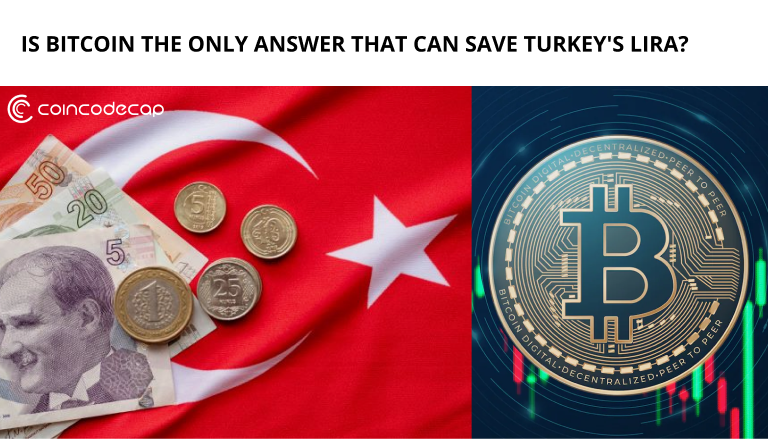Key Takeaways:
- As the country’s currency has plummeted to new lows, the number of cryptocurrency trades in Turkey has risen to one million per day.
- On Tuesday, the lira fell as much as 8.6% intraday and gained 18.5% on its second-largest day range.
- The last trading up 7% at $12.230 per dollar in little volume. The lira’s one-month implied volatility or predicted price fluctuations hit a new high, suggesting investor skepticism about the scheme.
- On Monday, Erdogan announced a series of measures to shift the burden of a weak currency to the Treasury and encourage Turks to hold lira rather than dollars.

Turkish President Recep Tayyip Erdogan has proposed an emergency measure to stem the lira’s historic decline and protect investors from volatile currency markets. One way to curb current foreign currency market demand is to guarantee that lira-denominated deposits yield does not fall below bank interest rates.
In early trading Tuesday, the lira hit a day high of 11.0935 per dollar but later erased some gains to trade at 12.8373 about 11 a.m. ET. It’s a significant improvement from the president’s announcement on Monday when the dollar hit a historic low of more than 18 to dollar.
If the devaluation of the lira versus fixed currencies surpasses bank interest rates, the Treasury will reimburse the losses of lira depositors. For example, if banks offer 15% interest on one-year lira deposits but the currency depreciates 20% against the dollar during that time, the Treasury, i.e., taxpayers, will compensate depositors. The tool will be available to anyone who has had a pound deposit account for three to twelve months. The central bank’s minimum interest rate will be the benchmark, and there will be no withholding tax.
Despite the vast fluctuations, the lira is still down more than 40% versus the dollar year to date, having gained over 20% against the greenback at one stage on Tuesday.
Erdogan highlighted efforts to ensure lira savings in a speech Monday evening, saying the government will step in to cover losses to lira deposits if their value versus hard currencies falls below the interest rates established by banks.
It’s an unusual strategy selected by a president who holds unconventional economic beliefs: Erdogan has long decried interest rates, referring to them as the “mother of all evil” and claiming that raising rates causes inflation rather than lowering it.
Suppose people with hard currency accounts migrate to the pound. In that case, it might assist the Turkish currency in combat inflationary losses while also costing Erdogan favor, even among his most ardent supporters. Hard currencies account for more than half of all deposits in the Turkish banking system. Since all accounts have a short average maturity, they are uncertain to be switched into new lira deposits in bulk.
With elections looming in 2023, Erdogan has pledged to maintain pressure for low-interest rates, which he claims will combat inflation. This viewpoint contradicts the orthodox economic theory, which holds that lower borrowing costs feed inflation by degrading a currency’s value.
In the last two years, Turkey’s president has ousted three central bank chiefs and purged other monetary officials, prompting investors to penalize the lira for what they consider to be a lack of independence by the Turkish central bank.
Last week, Erdogan declared that Turkey would increase its minimum salary by 50% beginning next year, which will assist the most vulnerable Turks in coping with rising prices. But, according to economists, it will also feed inflation.
Erdogan also announced on Monday that the government would increase its match on private pension contributions from 25% to 30% and establish steps to protect exporters against currency instability.
The president’s strategy has yet to be sketched entirely out, and many are doubtful.
“The recent move is clearly very significant,” Goldman Sachs analysts wrote in a note Tuesday. “But, it is also worth noting that the Lira has only recovered the losses it made in the last two weeks, and the year-to-date depreciation is still very sizable.”
While the pound’s worst period was gone, with some retail depositor confidence restored, he predicted that “the pound will remain volatile and under pressure, until interest rates provide a reliable anchor against inflation.”
According to Brendan McKenna, a currency strategist at Wells Fargo in New York, much would rely on whether depositors feel the strategy can be enforced. “At the moment, Turkish institutions have a low level of trust, therefore employing lira depositors may be tough,” McKenna added.
If the new technique fails, the Treasury will have to develop a way to reimburse lira depositors. According to Wolfango Piccoli, co-president of the consultancy firm Teneo, the central bank is likely to print money, further depreciating the lira. And, if the new instrument succeeds in stabilizing the lira, the real exchange rate would rise, shattering the weak currency’s ostensibly competitiveness, which is critical to boosting Turkey’s exports, a foundation of the government’s new economic model, he said.
The Turkish lira’s volatility could boost the price of bitcoin:
As Turkey’s economic woes worsen and the Turkish lira continues to fall, Bitcoin could be a viable option, providing a haven for the beleaguered country.
Bitcoin, the world’s largest cryptocurrency by total market capitalization, has been on an upward trend over the last 24 hours, displaying a daily profit ratio of roughly 4%.
The fact that US inflation recently hit a 30-year high, as well as news that China-based real estate company Evergrande recently defaulted on its $26.8 (US$19.2) billion debt, appears to be fueling the current instability. These events appear to have influenced the crypto market as well as the broader market structure, with the stock and commodities sectors suffering significant damage.
Turks, whose currency has lost 90% of its value since 2008, frequently convert the lira into dollars or gold. However, with Ankara attempting to make such operations more difficult and bitcoin prices surging this year, crypto trading has grown in prominence.
Independent crypto expert Michal van de Poppe said on Twitter that there was a reasonable probability that Bitcoin’s continuing price correction has finally come to an end and that the Turkish lira’s recent 40% price spike against the US dollar will offer a much-needed boost to the crypto economy.











